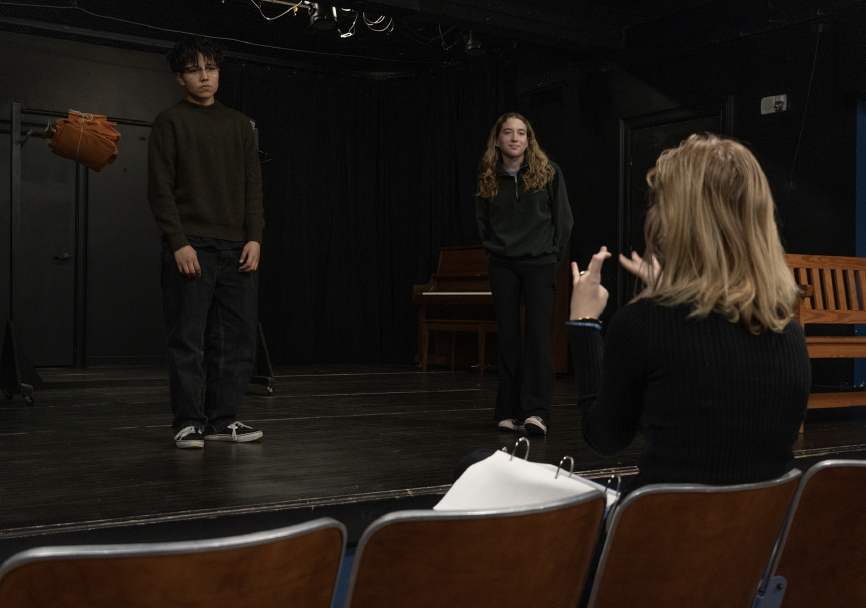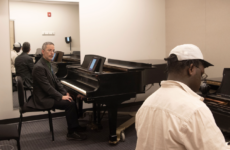
Eve Stanley ’24 directs actors in Everybody Talks by Tristin Hurst ’24.
By Nilan Kathir ’25
For the 12th year, the annual Fringe Festival will feature student writers, directors, and actors in a series of original plays. Students are steeped in the rehearsal process in preparation for their performances on February 8-9 in the Gelb Theater.
This year, Fringe is hosting four plays, along with a selection of movies and a spoken word performance. In following years, Fringe hopes to re-incorporate “original songs and stand-up,” Mrs. Kate Doak, the director of Fringe, said.
Among this year’s works are Tristin Hurst ’24’s play, entitled Everybody Talks, which aims to spread the message of being comfortable with yourself despite external factors, and Harper Marsden-Uren ’26’s play, The Writer, which reflects on relationship dynamics.
Fringe is an ideal way for students to explore their artistic talents, with the production attracting many students with prior theater training.
For example, actor Blake Steremberg ’26 has accumulated considerable acting experience through professional plays and Choate productions. Steremberg will be acting in both Marsden-Uren’s The Writer and Max Leventon ’25’s Talk to the Wall.
Similarly, Marsden-Uren, who also wrote a play for Fringe last year, has gained experience through attending writing summer camps. “I have been writing plays since I was a little kid,” she said.
Although many actors and writers come with previous experience, Fringe is open to students with all levels of experience in theater. Mrs. Doak said, “The challenge that we have is making sure that students know that it’s accessible to them as an opportunity if they don’t have a huge amount of experience.”
The planning process for Fringe is carried out over the course of an entire year. The Choate Fringe Festival Board, a group of students that select the plays, cast actors, and direct the chosen works, leads a large part of this process. The actors and directors then meet three times a week for an hour each time to prepare for the plays taking place during the winter term.
The process of producing a play is initiated by the playwrights, and the task of bringing the script to life is given to the directors. This relationship requires frequent communication between the two roles to enable adequate representation of both individuals’ artistic preferences.
After the script is finalized, the actors are given their lines and scenes, which they spend months practicing. Their preparation then ramps up significantly during tech week on the weekend of January 27 before the show’s opening nights.
According to Marsden-Uren, splitting up the roles in this manner is beneficial as “you get to see all of the exciting, different aspects of putting on a show and how difficult and how rewarding it is [with everyone] being able to experience their own little theater in their own little way.”
For Mrs. Doak, the best part of being an organizer for Fringe is “working with the kids and the collaborative environment of the show.” This sentiment is shared by adults and students alike.
With writers and directors in “constant communication,” the success of the show is dependent on every participant fulfilling their varied responsibilities, Hurst explained.
Hurst appreciated the opportunities the Fringe Festival provided him with to develop as a leader. “[I grew through] pushing my cast to try different things [and] experiment with different emotions,” he said.
However, even with the passion and talent that the Fringe Festival hosts, it has its associated challenges. “It can definitely be an adjustment to be in charge of your friends or classmates,” Hurst said of the directing process.
As the curtains open next month, the months of hard work and preparation put in by the actors, writers, directors, and organizers will culminate in the two-day production.
Hurst shared, “It’s just nice to have all this experience where I can build up my creativity and build up my skills with support.”




